Van Life 101: How-To Guide for Living in a Van
This is your ultimate guide to van life! Learn everything you need to know about living in a van so you can follow your van life dreams.
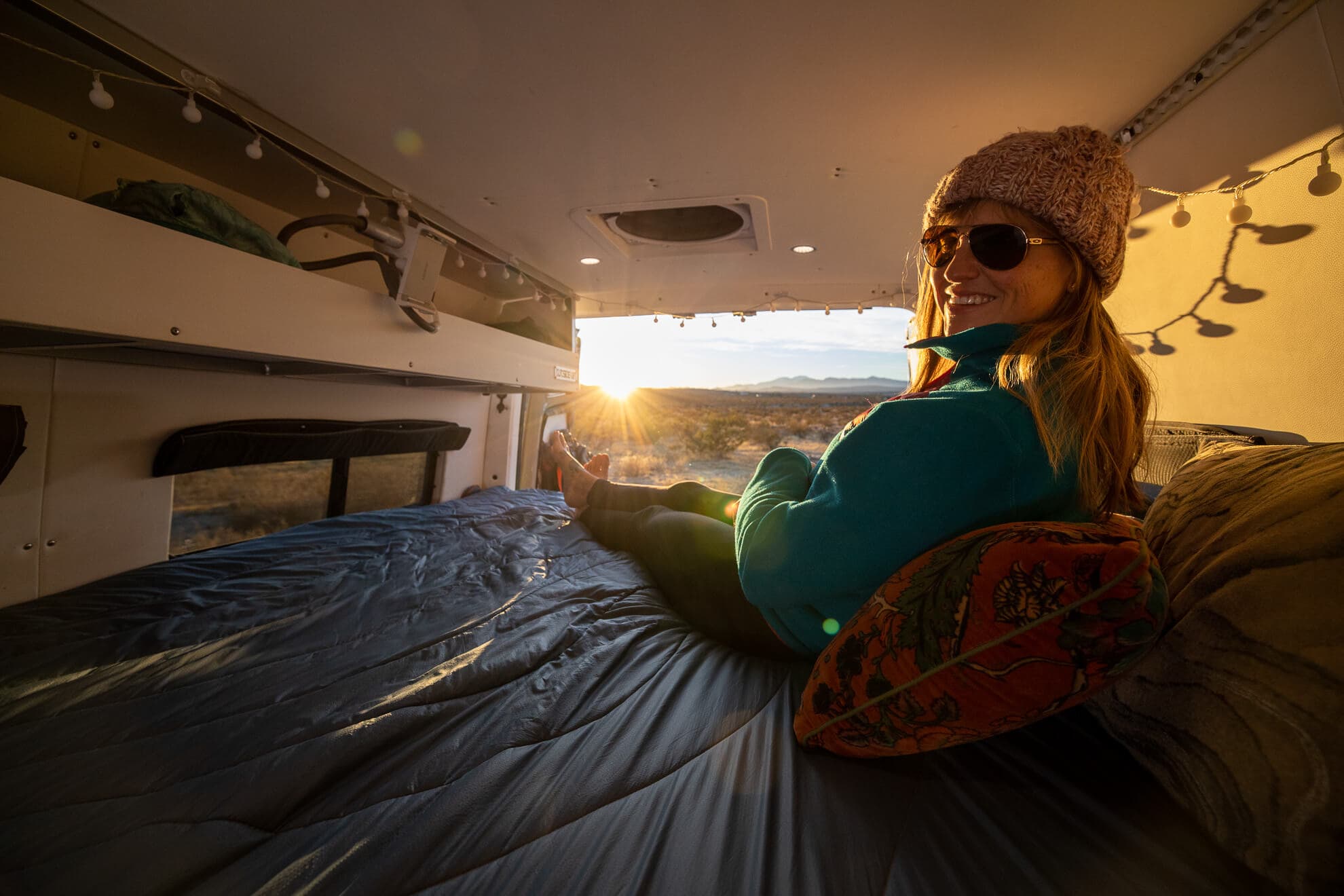
In 2016, I took the plunge into Sprinter Van Life. I sold my car, moved out of my apartment, and had a 4×4 144″ Sprinter built out into a tiny home on wheels with a full bathroom. After logging 30,000 miles and learning what I truly wanted in a van, I sold that first van and started over. The second time around, I went with a bigger 170″ 4×4 Sprinter Van that was converted by Outside Van. I ditched the bathroom, made room for mountain bikes and other outdoor gear, and never looked back.
Now I live full-time in a Rossmonster adventure truck camper with my partner Ryan and our young son, embracing life on the road as a family. We have traveled all over the United States, Canada, and Baja, Mexico racking up countless outdoor adventures and encounters with all kinds of cool people that I’ll never forget. We’ve driven 14,000-foot passes in Colorado, leaf peeped in New England, road tripped the Canadian Rockies, and more.
I’ve fallen in love with this lifestyle, and I’m not sure I’ll ever stop. I truly believe van life is one of the most fulfilling ways to live and travel, and for those of you who are dreaming, I’m here to inspire you and show you how it’s done.
Whether you are considering van life as a part-time or full-time endeavor, investing in or converting a van is a process full of big decisions. Navigating the many different options, set-ups, conversions, and even designing your nomadic lifestyle can feel overwhelming. So to make it easier for you, this blog post is the ultimate van life 101 guide filled with van life how-tos and answers to some most frequently asked questions.
In this post, I cover everything from choosing and converting a van plus other helpful tips like how to earn money on the road and where to find essential amenities such as showers and fill stations. In many cases, I link to additional resources on our blog if you want to dive deeper.
Whatever your goals are, remember that there’s no right or wrong way to do van life — and that’s the best part. It’s all about making your life on the road work for you.
This post may contain affiliate links.
Why Van Life is Awesome
There are countless reasons to transition to a life on the road and these reasons differ for everyone. Whether you’re looking for a grand adventure or you want to save money, here are a few of my favorite reasons for why van life is awesome.
1. Freedom to travel and explore on your own schedule
Van life gives you the freedom to explore the places you’ve always dreamed of visiting and to do so on your own schedule. Whether that’s visiting all of the National Parks or doing a slow cross-country road trip while visiting all 50 states, van life gives you the ultimate freedom to travel without time constraints, reservations, or agendas.
2. Van Life teaches you to embrace a simpler lifestyle
Living in a van requires you to embrace a simpler lifestyle with fewer belongings. You’ll have to prioritize the important things in your life and let go of the things that aren’t essential. For many people, this is actually one of the greatest lessons of van life!
3. Spend more time in nature
Van life can be a great way to spend more time in nature. From dispersed camping to visiting National Parks, living in a van allows you to get outside and explore the great outdoors. Vans can also be great basecamps for skiing or to start and finish overnight trips like multi-day backpacking adventures.
4. Save money
Living in a van can be as expensive or as cheap as you want it to be. Most van lifers enjoy the simplicity of van life, which often means camping for free on public lands and enjoying the outdoors free of charge. If you’re a full-time van lifer, you also won’t be paying rent or utilities, so it is very possible to save money while living on the road.
5. Be location independent
One of the greatest benefits of living and working on the road is that you can be location-independent. You may need to find reliable wifi every now and then if you work remotely, but for the most part, location independence while living in a van means that you can go where you want when you want.
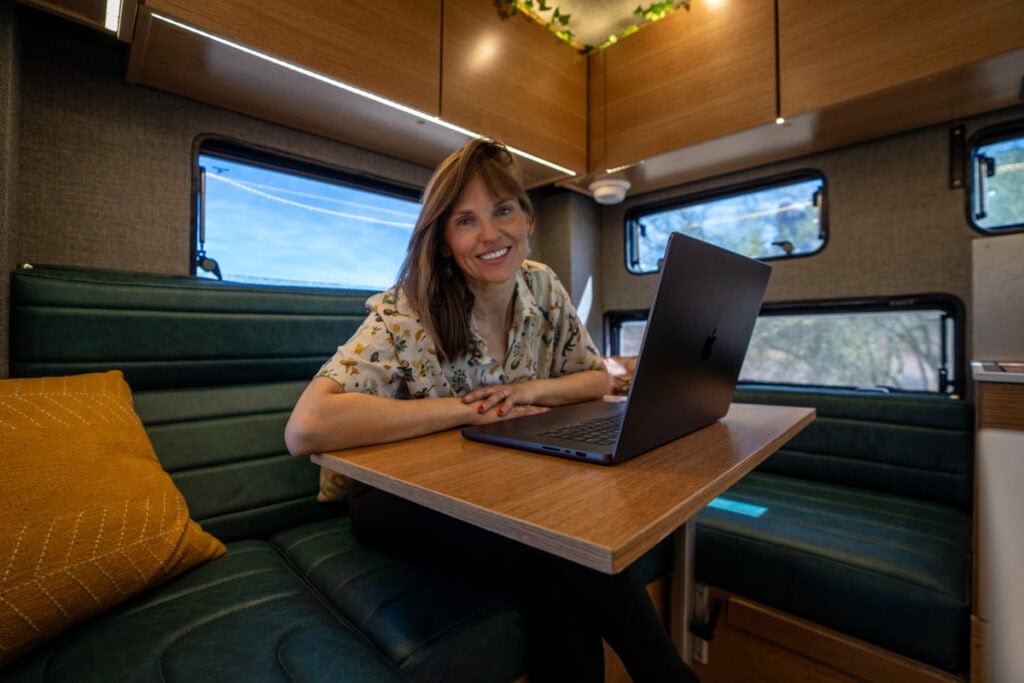
Save this post!
Enter your email & I'll send this post to your inbox! You'll also receive my weekly newsletter full of helpful advice for planning your adventures.
The Pros & Cons of Van Life
Before jumping into van life full-time, it’s important to consider a few of the highlights and challenges that come with living in a van. Below are a few of the pros and cons of van life that I’ve encountered on the road.
Van Life Pros
- Flexibility to travel where and when you want on your own schedule. It’s liberating to not have to be tied down to place and time.
- Depending on your personal budget, fewer expenses may mean that you can save money and reach financial goals
- Live more simply with fewer things and belongings
- Spend more time outdoors
- Meet like-minded people on the road
- Unplug from the constant stream of news and social media
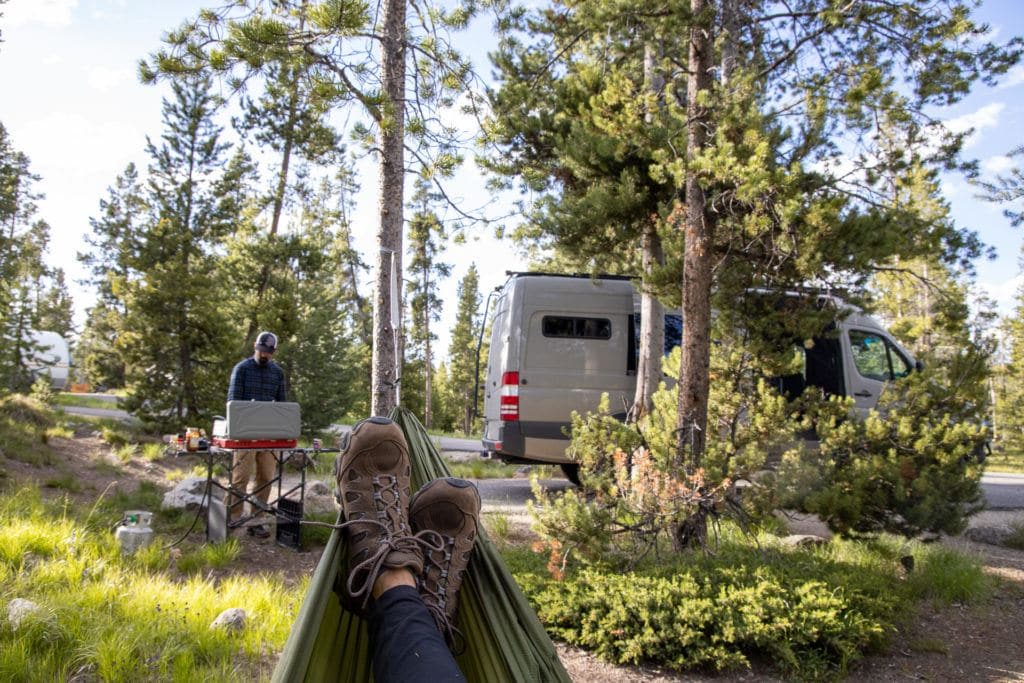
Van Life Cons
- Showers are less frequent
- Space is tight, especially if you share your van with a significant other or pets
- Vans get messy very fast and require constant cleanup
- Finding fill and dump stations is an undesirable chore
- You’ll likely spend more time in public restrooms
- You have to be mindful of safety when parking and choosing campsites
- You need a backup plan in case you get stuck or your van breaks down
- City driving and exploration can be a pain
- Cell service and wifi can be unreliable
Read next: Looking for more tips on whether you should give van life a go? Head over to my post on Van Life Pros & Cons.

How to Prepare for Van Life
When preparing for life on the road, there are a number of considerations to think about. Questions like “What will I do with all my stuff?” and “What gear should I bring with me?” are important things to think about. You also might be worried about how to break the news and talk to your family about your van life plans. There’s no one right answer to these questions, but below are a few ideas to help you get prepared for van life.
What To Do With All of Your Stuff
How you choose to handle downsizing your belongings depends on your situation, how long you will be on the road, and your level of attachment to your stuff.
When trying to determine whether to just sell everything you own before transitioning into van life or to get a storage unit, there are a number of questions you can ask yourself to help you make the decision:
- Do you plan to travel long-term (more than a year)?
- Do you know if you’ll be returning to the same place once you’re finished traveling?
- Look at every item you have and consider: is it valuable? Sentimental? Historical? Irreplaceable? Why have I chosen to keep this for so long? Is this something I absolutely need or want?
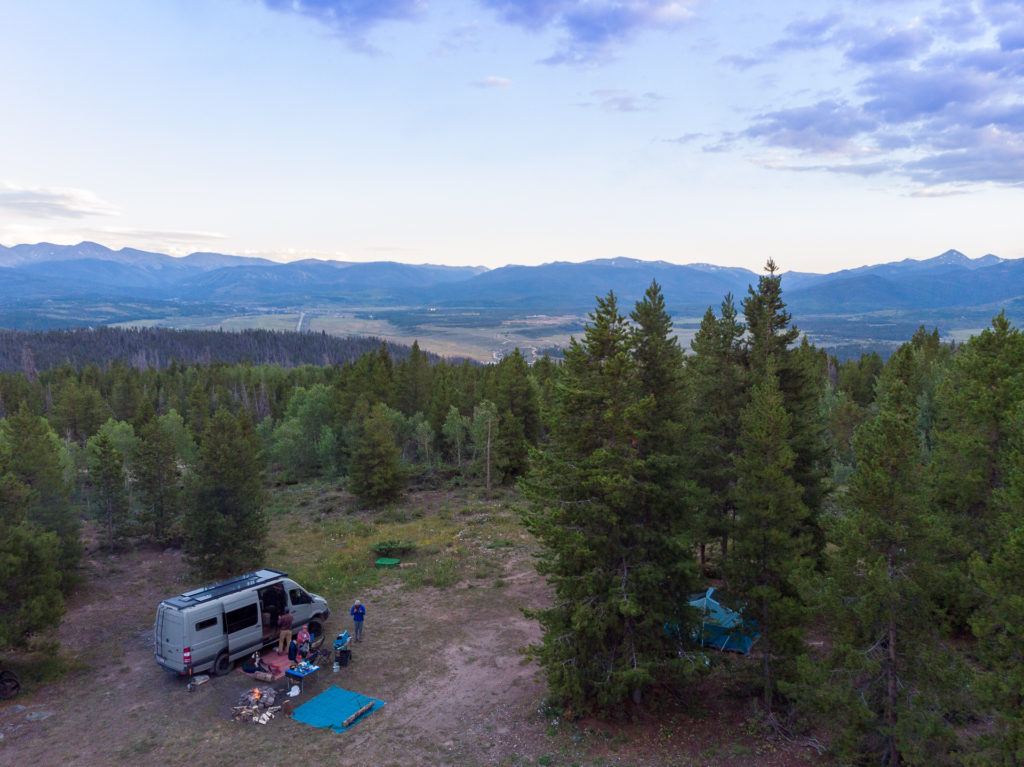
Option 1: Put it in storage
If you don’t know how long you want to do van life and you know you want to return to the same city when you are done, then a storage unit might make a lot of sense. If you have a lot of valuable things and furniture that you don’t want to let go of, renting a storage unit will also be the way to go. Depending on where you live and the size of the storage unit, storage units can cost anywhere from $50-200 a month (or more).
Some things are important to keep safe, like documents, photos, letters, and portfolios for example. If these are the most important items you’re concerned about, consider digitizing them and keeping several copies on external hard drives and on Google Drive. A safe deposit box is a good option for important documents, jewelry, or small family heirlooms. You could also store these items at a friend or family member’s house that you trust.
Otherwise, sort through every item piece by piece and decide what can be sold, donated, given to friends, recycled, or thrown away. Then, do it again. Do it a third time if you need to. Invite a friend over that’s good at getting rid of things and solicit their help. After going through this process multiple times with a discerning eye, if you need to get a storage unit, get the smallest and least expensive one possible to cut down on cost and burden.
Option 2: Sell your stuff
Selling your stuff is a great idea if you’re considering moving somewhere else after your travels, if your stuff doesn’t hold much sentimental value, if it’s replaceable, or if you plan to transition to full-time van life indefinitely. It’s also a great way to get a little extra cash for van life.
Once you’ve gone through the sorting process and decided which items can be sold, list the items on Craigslist, Facebook Marketplace, LetGo app, and OfferUp app. Post flyers or host a garage sale. If you feel comfortable, share with people what you’re doing and why you’re inspired to travel in a van. Most people will be happy to support you, even if it means they just buy something small from you or tell their friends. Share your excitement and intention in minimizing your stuff.
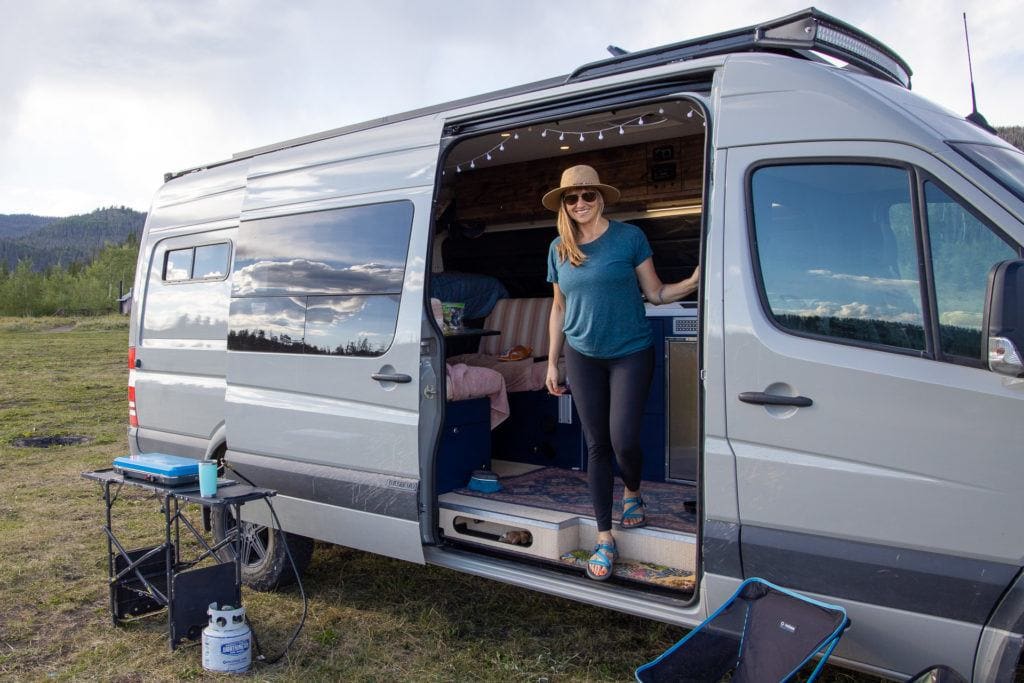
What To Do With Your Home
If you own your home, you’ll need to decide what to do with it. If you love your house and don’t want to sell it, consider renting it out. It will help cover your bills (and maybe even bring in some extra money). Plus when you are done with van life, it will make your transition back to your home base pretty painless.
Another option is to rent out a single room to someone you trust, like a friend or family member. They get to live there alone while you’re traveling (what a score!), and you get to rest easy knowing that someone is taking care of your house.
Lastly, there are property managers that will help you list and rent your home on Airbnb or VRBO. You will need to pay for these services, but the upside is that they will take care of all the logistics like managing the rental calendar and hiring people to clean.
What To Do With Your Car
The options for your car are the same as I’ve been discussing for the rest of your stuff: store it, keep it at home, or sell it. If you know you’ll be coming back regularly and will need a car, or if you’re only hitting the road for a few weeks or months at a time, keep it.
Cars don’t fare well sitting unused for long periods of time, so keep this in mind. Have a friend come over once a month to start it and drive it if they can. If you have a house with a garage or driveway where you can store it, that’s ideal. Otherwise, you’ll want to find somewhere that you can park it for as long a period of time as you need.
There are climate-controlled storage facilities that will store vehicles, but these tend to be costly over the long term. If you’re committed to transitioning into full-time van life, consider selling your car and using the money for your van or the first few months of travel expenses while you’re transitioning to life on the road. Again, share with people why you’re selling your car if you go this route. If it’s not worth much, you could consider donating it to a good car donation charity that can pay it forward.
Buying a Van
How To Choose A Van
Knowing how to choose the right van for van life means understanding what’s right for you. There are a ton of options out there and you probably have a few questions: Should you buy a used or new van? A Sprinter, a Ford Transit, a Dodge Promaster, or a Volkswagen? Or maybe an adventure truck is better suited for your needs? Build it out yourself or invest in a professional conversion? Here are some considerations to make before buying a van:
- Where will you be driving your van?
- Will you need 4×4?
- Do you plan on living in your van during winter?
- How much gear storage do you need?
- Are you handy with fixing things?
- What is your budget?
- Will you build it out yourself or hire someone to do it for you?
- Do you want a shower and/or a bathroom?
There’s no one right way to do van life, but it’s important to get an understanding of what you want your van lifestyle to look like and what will work for you.
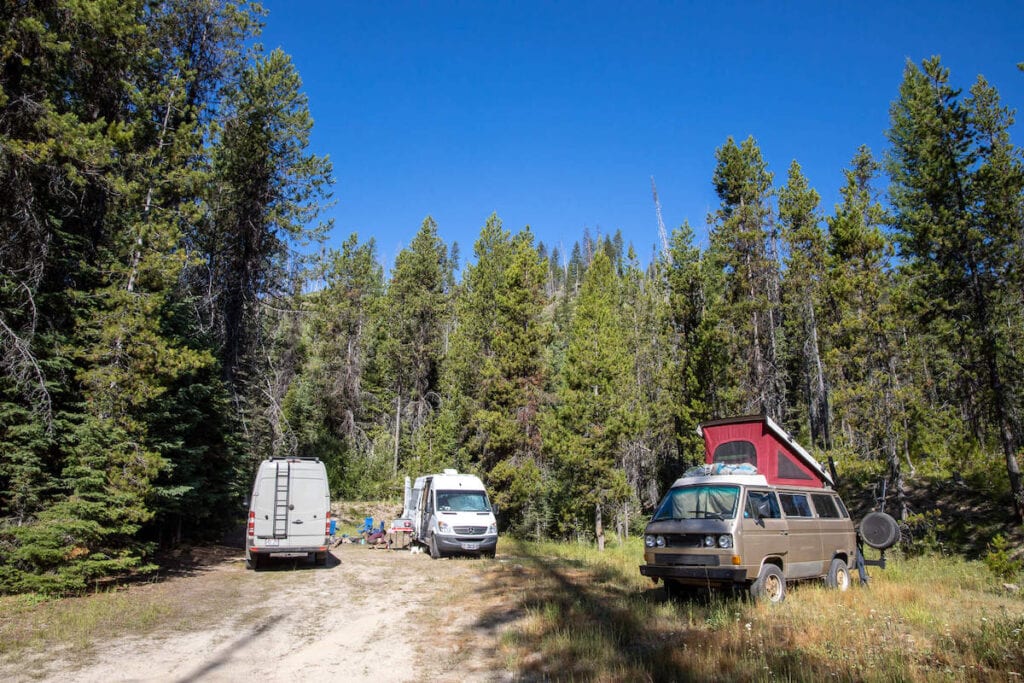
Most Popular Van Options
When you’re deciding what type of van to get, these are the most popular types of rigs that you’ll find on the market:
Sprinter Van
If you’ve been reading this blog for a while, it’ll come as no surprise that the Mercedes Benz Sprinter Van is my vehicle of choice for van life. Because I spend my winters in snowy climates and like to spend my summers exploring backcountry roads, a 2-wheel drive was a no-go for me. Up until recently when the Sprinter switched to an AWD system, the Sprinter was the only van in its category to have a factory 4×4 option. Whether the Sprinter you get is 4×4 or the new AWD, it is a capable beast with a ton of storage space for bikes, paddle boards, and more. The downside of Sprinters is they are the most expensive van option and it’s not as easy to find mechanics to work on Sprinters.
High-roof Sprinter vans are perfect for those who want to be able to stand up and walk around in their van (and want something more modern and reliable. They also come in two different lengths – the 144” and the 170” wheelbase.
Dodge Promaster
The Dodge Ram Promaster is another popular vehicle choice for van life and it is considerably cheaper than Sprinters and Transits. It comes in two different lengths – 136” and 159” wheelbase, so it’s slightly shorter than a Sprinter and has less ground clearance, but it gets better gas mileage. The Promaster is also the widest vehicle option of the common panel vans. Promasters are typically FWD which can make driving up steep mountain passes and sandy areas more difficult.
Ford Transit
Like the new Sprinter, the Ford Transit also comes AWD option (2020 and newer), making it more versatile than a traditional 2-wheel-drive van. Ford Transits are also a bit less expensive in price and maintenance than Sprinters and come with a higher interior height – the AWD has an interior height of 6’8! Transits also come with 2-wheel drive RWD options.
VW Vanagon, Westfalia, or Buses
These are great for handy folks who love a vintage vibe. Keep in mind that they might not be as reliable as newer vehicles and will require more upkeep. They also tend to not get as good gas mileage.
Budget cargo vans
Ford Econolines, Chevy G Series, Chevy Express, and Chevy Astros are popular budget cargo vans. These vans are typically much older but they are the cheapest option for getting on the road. Remember, van life comes in many shapes and forms, and sometimes a budget DIY build is all you need.
Read next: Find more tips about what van to choose in my post on Comparing the Best Vans for Van Life
New vs Used Vans
There are lots of pros and cons to think about when buying a used or new van.
Buying a new van obviously has its perks. It will come with a limited warranty, everything will be new, and the van becomes your ultimate canvas for a custom van conversion.
But you’ll also be paying quite a bit of money for a new vehicle, especially if you then hire someone to build it out for you. Buying a used van can cut down on initial costs and allow you to put more money into the conversion.
Another option is to find a used campervan that has already been converted. You’ll save yourself a ton of time and possibly money. The downside of buying used is, unless the van was converted by a professional conversion company with a lot of experience, there are really no guarantees on the quality of the conversion. Furthermore, if you have issues down the road, it might require more problem-solving.
Where to Look For a Van
If you’re sold on a Sprinter Van, check out this blog post where I share a list of forums and websites where you search for your perfect Sprinter to buy. For more places to search for Sprinters as well as other types of vans, the downloadable PDF below contains a full list of websites, forums, and Facebook groups where you can search for a van.
Helpful Tip
Rent A Campervan
If you’re really not sure what kind of van you want, renting a van is a great way to, literally, take it for a test drive. Check out this blog post for a list of places to rent a campervan for a night, a weekend, or more!
Converting a Van into a Camper
You’ve settled on the type of van, got the design inspiration, and an epic road trip calling your name. However, when it comes to actually building out your home on wheels, there’s a lot to think about. Designing your van shouldn’t be a rushed process, and doing your homework before you start the conversion process is key. The more knowledgeable you are about layouts and components, the more likely you’ll be happy with the final product.
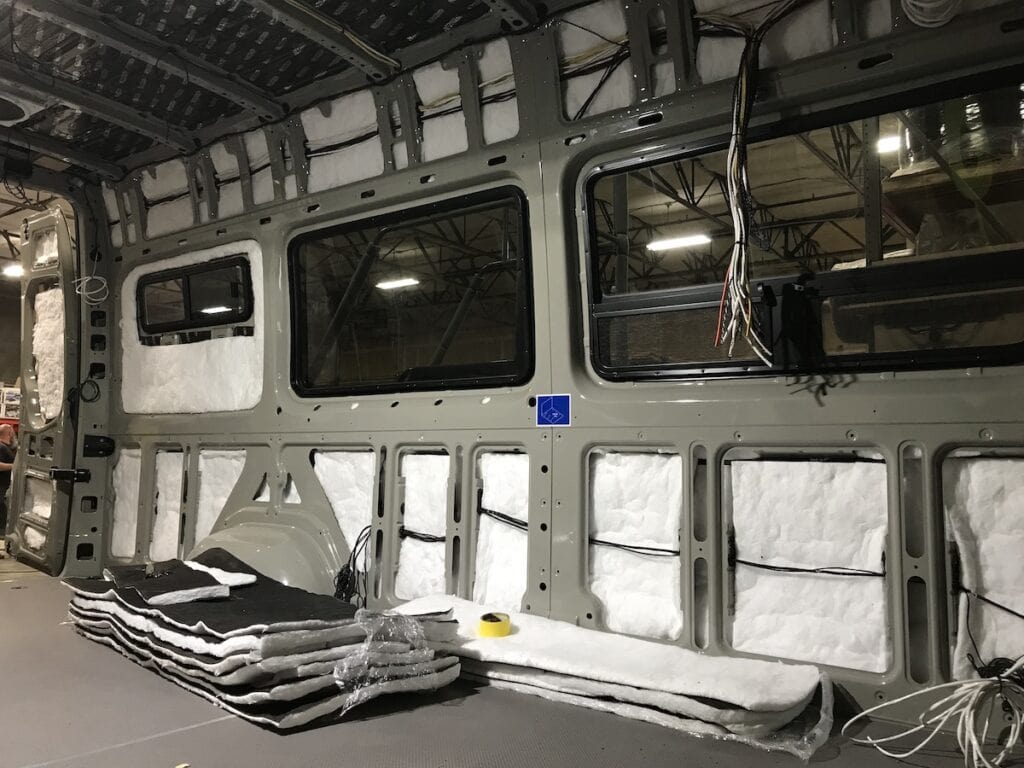
There is so much more than I can write in this one blog post about planning your van conversion, so I suggest you head to my Van Life homepage and scroll down to the section on planning your van conversion. There you will find inspiration and more than a dozen blog posts with all of the nitty-gritty details on building out a van. From insulation to flooring, to bed styles, galleys, and solar power systems, we provide all of the information you should know in order to make educated decisions about your van build.
Designing your Van’s Layout
Here’s a quick pro tip: Take your empty van out for a trial run before it is converted. Throw in a sleeping pad and bag, a cooler, and your favorite camping gear, and go on an adventure.
You can learn a lot about how you’ll use the space after one week on the road. You may think you want room for kayaks only to find that you didn’t use the kayaks once on your road trip. Or a bathroom might seem like a necessity until you realize getting by without a bathroom (or at least a shower) in your van isn’t that difficult.
What you learn on this trial run will give you a much better idea of what you do or don’t want and will better inform your floor plan ideas.
See this blog post for more things to consider as you design your van’s layout.
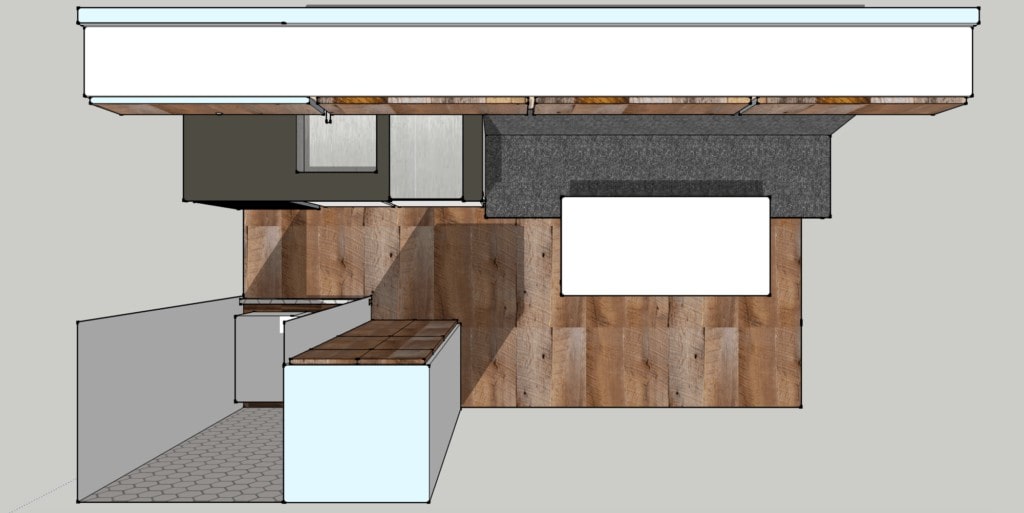
DIY or Hire a Conversion Company?
After you purchase your van, the next step in van life 101 is deciding whether you will hire someone to convert it or if this will be a DIY job. There’s no right or wrong answer and you have to evaluate your personal situation to decide what’s right for you. I go over all the pros, cons, and considerations for a DIY van build vs hiring a campervan conversion company in this blog post.
If you have experience building stuff and have the tools, you’ve set aside the time, or you simply think that building out a van would be a fun and enjoyable process, going DIY can save you a lot of money. I’d just recommend setting aside more time than you think you need and having wiggle room in your budget.
If you do decide to hire a company, do your homework to make sure the company is legit. There are a lot of “van conversion” companies popping up everywhere who see the growing demand for van life. However, many of these companies are inexperienced and are delivering a low-quality product. To properly screen these companies, you need to do more than just scan their website and Instagram feed. You need more than pretty pictures to ensure you’re going to get a well-built, durable van. Your builder also needs to have an understanding of solar, materials, plumbing, and how to build cabinets in a van that is constantly flexing.
In this blog post, I share a number of questions you should ask before hiring a van conversion company.
Living in a Van and Tips for the Road
Some of the most common questions I get about van life are about the basic everyday necessities. Topics like using the bathroom, showering, finding the best overnight parking spot or scouting out a good campsite, cooking three meals a day, and even what to do about your mail are always on top of mind for prospective van lifers.
How to Get Internet/WiFi in your Van
One of the biggest concerns I hear from prospective van lifers is how to get internet in your van. If you work remotely, this is an important consideration you’ll need to address before hitting the road, but truthfully wifi and good cell service aren’t hard to come by. I rely on a combination of using my cell phone plan as a hot spot when I’m in areas of service and Starlink when I’m out of service.
As far as choosing a cell provider, I recommend finding a plan that comes with unlimited high-speed data. Make sure you’re on a plan that won’t throttle/slow down your data after you’ve used a certain amount or in times of congestion, or you might find yourself very frustrated when you’re trying to find a campsite late at night or get work done.
I’m currently on the Visible+ plan by Visible, and I’ve been very happy with it. It’s only $45 a month (or $395/year if paid upfront) and includes unlimited talk, text, 5G Ultra Wideband, 5G and 4G/LTE Data on Verizon’s network. It’s month-to-month with no contract, taxes, or fees, making it a cost-effective option for van lifers.

The Visible+ plan I’m on also offers unlimited mobile hotspot usage at faster data speeds than other cell phone providers which allows me to conduct Zoom calls, upload photos to my website, and do all the research for my travels on while working on my laptop.
When I’m completely out of service and need to get online, I use Starlink. I’m on the ROAM plan which is also month-to-month. The Starlink is a bit of a power hog, so you’ll need a robust power system to run it if you are working full-time from your van. I store mine in a case in my van garage, but it’s a kind of a pain to set it up. I recommend getting it mounted to your roof, so you can use it more readily.
Auto Insurance for your Van
If you want to insure your entire build and not just the vehicle, you’ll need an RV Insurance policy.
Progressive Insurance is one of the few companies I’ve found that offers full replacement coverage for class B converted vans and your belongings and this is what I use (read my full Progressive RV Insurance review here), but they only cover professionally converted vans.
Roamly is an insurance company that caters specifically to van lifers and RVers that many people have had good luck with. You can read more about the different options for choosing an RV policy for van life here.
Get a free insurance quote from Roamly
Roamly caters to van lifers/RVers and they know how to tailor insurance policies to fit travelers’ needs.
Plus, Roamly customers save an average of 25% on their insurance policies compared to other companies.
Health Insurance
If you don’t have health insurance via your employer, you’ll want to shop for health insurance on healthcare.gov. The key is choosing a policy that has good nationwide coverage so you don’t get stuck with a huge out-of-network doctor bill when you’re traveling.
For more tips and information about healthcare coverage on the road, read my post on Health Insurance for Van Life.
How to Get Mail on the Road
There are a few different options for getting mail on the road. If you have a P.O. Box, you can give a trusted friend or family member the key or ask a neighbor or friend to collect your mail from home. You can also use an Amazon locker for any packages shipped from their site.
Need to send yourself mail? Ship it to friends’ and family’s houses that you know you will be visiting. You can also ship packages to many shipping and office stores. I usually google “receiving packages or package holding in xx” with the city I’ll be in and usually a few options pop up. Then I call for details on how the package should be addressed and what it will cost for them to hold the package. We have a lot more tips and ideas for getting mail on the road in my Establishing Residency & Getting Mail as a Full-Time Van Lifer post.
Finding Bathrooms and Showers
After two years of traveling in a Sprinter Van with a shower and toilet, I decided to nix the shower in my second van conversion. I found an interior shower used up too much water and took up valuable space, among other reasons that I outline in this post on why you don’t need a shower.
It’s easy to find a shower and toilet in most paid campgrounds, RV parks, and even gyms or your friend’s house! Of course, if you wan to camp for free on dispersed land, this means you won’t be showering as frequently as you would at home. If you’re worried about staying fresh and clean on the road, here are some camping hygiene tips for women.
If you know that you do want a shower and toilet in your van, I have several posts to give you some design and layout ideas:
In my current van, I use a pee jar for going pee and a Cleanwaste Go Anywhere toilet for #2. It’s easy to use, there is no cleanup, and it’s stows away at the size of a briefcase so you don’t waste valuable space in your van.
Read next: Showers can use up a lot of water. Read my tips on how to conserve water when living in a van.
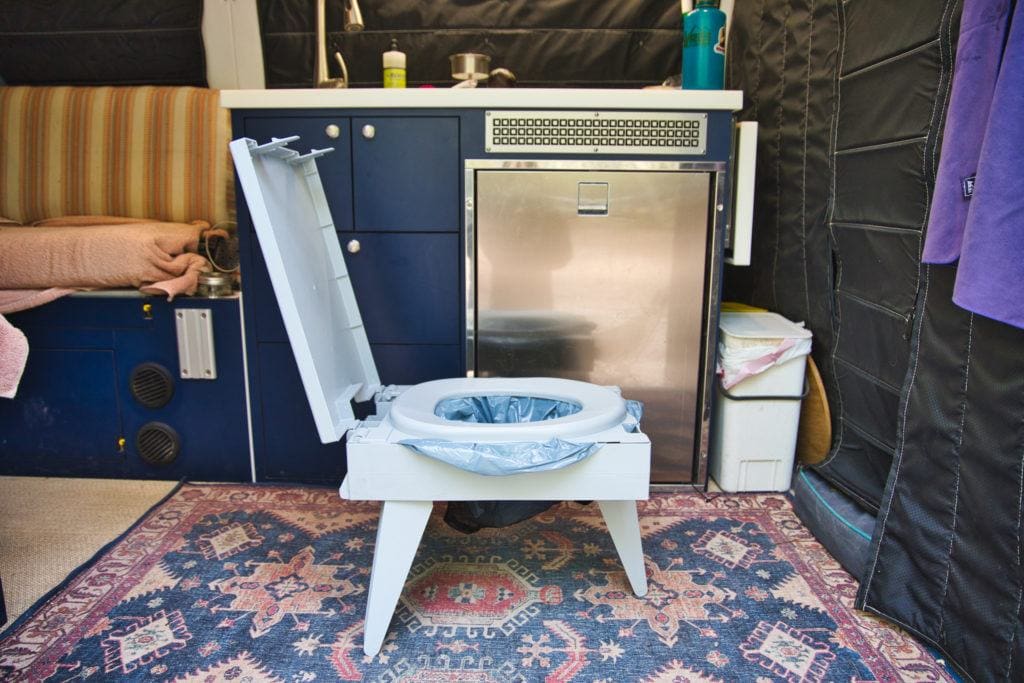
Cooking in your van
Van life cooking can seem daunting at first – with such a small space, limited access to water, and without the usual conveniences of home (oven, microwave, large fridge, etc.), how can you make easy, healthy meals on the road? Turns out it’s pretty easy! I have a few guides to help you whip up delicious meals on the road in no time:
- How to Meal Plan and Cook in a Small Space
- Camp Kitchen Essentials for Van Life
- 15 Camper Van Kitchens for Layout and Design Inspiration
Water Fill-Ups, Dump Stations, and Laundry
One of the least glamorous sides of van life is chores such as refilling your water, dumping your greywater, and finding places to shower. These are chores that you just don’t have to think about when you live in a house! However, it’s pretty simple to find water, dump stations, showers, and laundromats on the road.
Common places to refill your water tanks are RV parks, gas stations, and public parks. Usually, RV parks and campgrounds also have dump stations to dispose of your greywater.
If you downsize your wardrobe with the tips I share a little further down in this post, you should be able to make it a couple of weeks without washing your clothes. You can also do laundry at a laundromat, by hand, at an RV park (they’ve also got showers!), or ask to use a washer and dryer at a friend’s or family member’s home.
Read next: Use my guide on Finding Water, Dump Stations, & Showers on the Road
How to Find Free Places to Park and Camp
How to find camping is one of the biggest questions I get from people who are just starting van life. It can be a little overwhelming at first, but the key is utilizing the right tools.
My favorite van life apps for finding a good campsite are iOverlander (free campsites) and The Dyrt (paid campsites). I also like using Benchmark Atlases to find Forest Service land and dirt roads with dispersed camping. Here are tips for finding free camping and stealth camping that have a lot more information.
#1 campsite finder app
Try The Dyrt PRO free for 30 days
Get a FREE 30-Day membership to The Dyrt PRO, one of our favorite apps for finding campsites.
Perks include:
• 5,000+ free camping locations
• 1,000+ campground discount network
• $0 extra booking fees
• Get reservations at sold-out campgrounds, and more
Use the code BEARFOOT to get 30 days free!
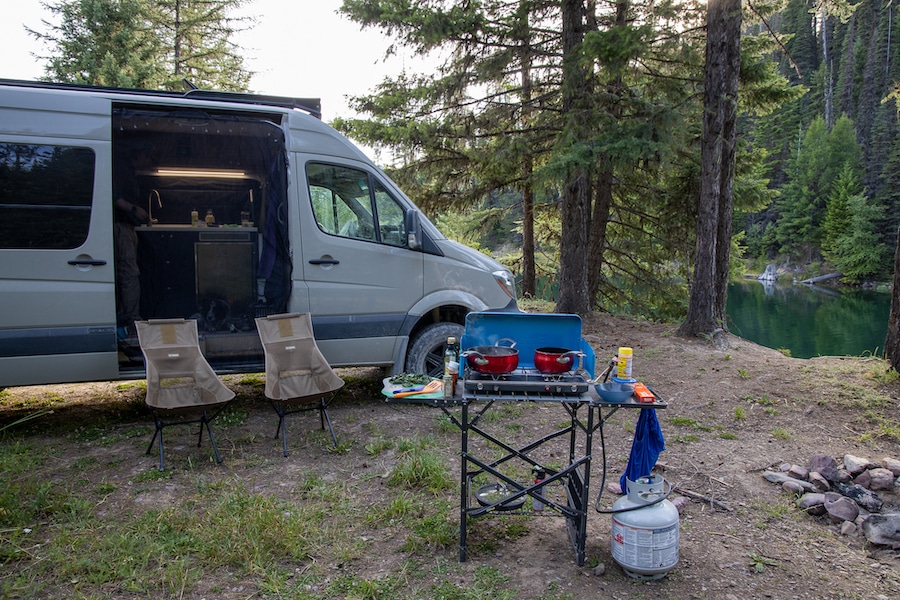
Finding Fun Local Activities & A Van Life Community
I love to use the AllTrails and MTB Project apps for finding hiking and biking trails. Aside from that, one of the best ways to get good beta on fun things to do is by hanging out at a restaurant, cafe, or bar and chatting with the locals.
See all my favorite trail finder apps and websites for more ways to find things to do on the road.
In addition to finding awesome things to do in the places you travel, building a van life community is another great way to enjoy the road. Social media is an easy way to connect with other van lifers by searching van life hashtags on Instagram or joining dedicated van life Facebook groups.
If you’re not big on social media, check out van life gatherings to meet other nomads. I host Open Roads Fest near McCall, Idaho and it’s the perfect place for nomads and aspiring nomads to meet. You don’t need a van to attend!
Van Life Safety
It’s totally natural to have some fears about being out on the road, and you are probably asking if van life is safe. When I first started van life, I was a solo female van lifer, and I’ll admit that the first trip I went on, I was very scared, particularly at night.
Now that I have 8 years of experience under my belt, I’ve learned how to manage my fears with a set of practical van life safety tips that help me feel more confident and secure when I’m traveling in my Sprinter Van.
Here are some tips for staying safe in your van:
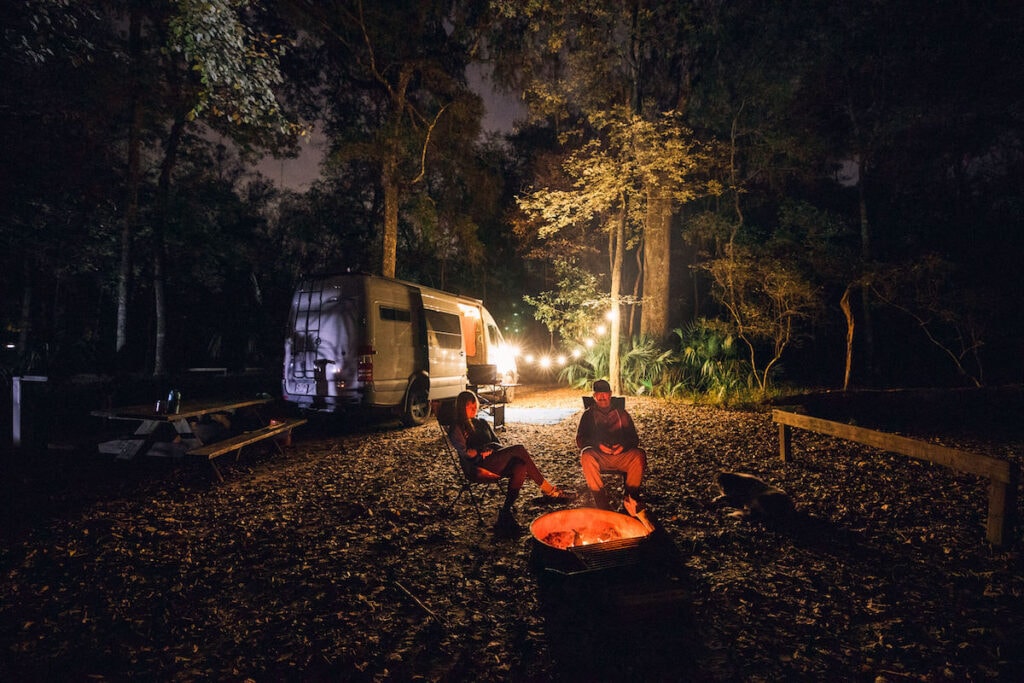
Van Life with Pets
As a dog owner, I completely understand questions about bringing your dog or cat with you in your van. I’ll just say that van life with pets is awesome. We’ve been doing van life with our adventure dogs Charlie and Gumbo for over 7 years. I truly think van life dogs have the best life. Between running around outside, making dog friends, and getting scraps of food leftover from camp cooking, van life dogs have it made.
But that’s not to say that there aren’t important considerations and precautions you need to take when living in a van with a pet. First, it’s essential to think about how to keep them cool if you leave them in the van alone especially if you don’t have an AC. We hardly ever leave our dogs in the van except for quick errands or maybe a bit to eat and only do so if the temperature outside is mild. It can also be limit where you can go since not many National Parks are dog-friendly.
Dogs are generally welcome at official campgrounds, but they will need to stay on a leash. If you prefer to let your dogs run free, you’ll need to find free dispersed sites that have fewer regulations and rules.
It’s very hard to keep your van clean with dogs. Between the hair and the dirt, it feels like an uphill battle. We keep a Dyson cordless vacuum in our van and use it almost daily. It has attachments that you can use to vacuum up the bed too.
Need more tips? See my post about doing van life with dogs that is full of advice.
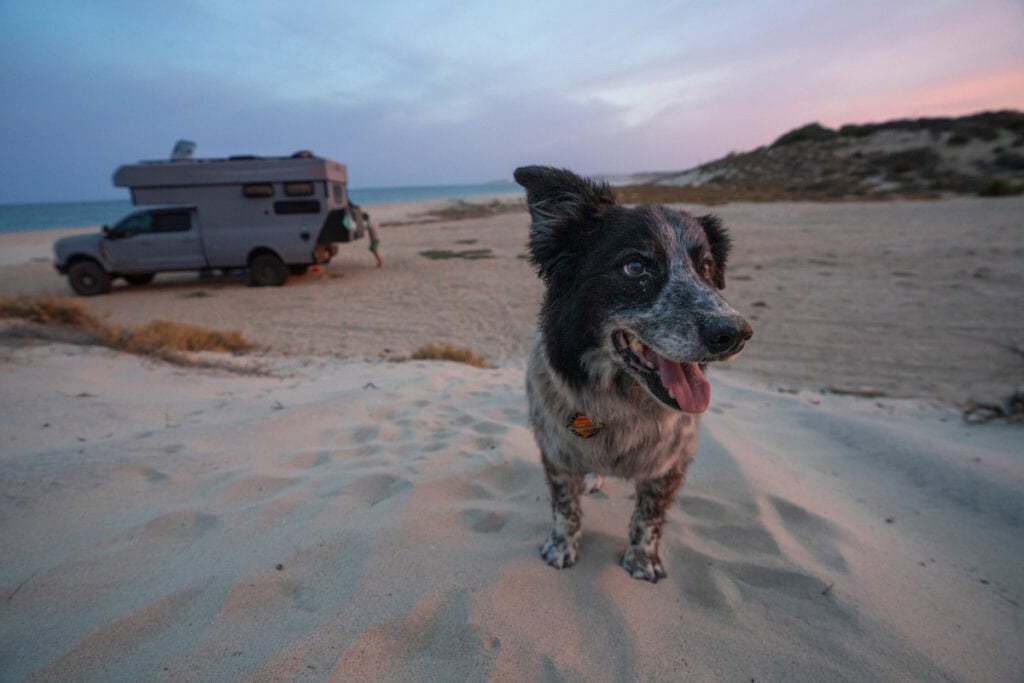
The Importance of Leave No Trace
No matter what you’re doing, it’s so important to be responsible enjoyers of the outdoors. Even in a van, where you can easily come and go, being mindful of your footprint will make a huge difference in preserving these places for years to come.
Before you head out, familiarize yourself with the Leave No Trace principles to help minimize your impact at the campsites, on the trails, or even answering nature’s call in the woods. Also, make a commitment to leave places better than you found them by picking up any trash left behind by other campers.
Need to brush up on your Leave No Trace skills? Read about it here:
- Basic guidelines of Leave No Trace
- How to pick a campsite and Leave No Trace
- Safe campfire tips
- How to poop outdoors
Gear You Need for Living in a Van
The gear you need for van life can be boiled down to only having the items that you use most often in your daily life. Pay attention to what you’re currently using—or not using—so you can downsize to have only the essentials in your van. This is a great time to evaluate what you really need to be happy and to start thinking about ways you can potentially simplify your gear.
Check out a shop like The Container Store (it’s heaven for organizing nerds!) for different sized boxes, bins, and you guessed it, containers that can be easily stored in your van. Another great item is a handful of packing cubes that you can use to stash your clothing and soft goods and prevent clutter. For more ideas on how to stay organized in our van, check out this blog post on van organization tips and smart storage solutions.
Deciding what to bring clothing wise may be one of the most difficult parts of downsizing for van life. In my post on Van Life Clothing, I outlined the basic packing tips that have allowed me to maintain a minimalist wardrobe that is neat, comfy, and versatile. Check out these tips for van life clothing:
For the rest of your gear, you’ll want only the things that bring you a lot of joy and you use at least once a week. With that in mind, check out these blog posts to get the full list of the best gear for van life:
- 30+ Must-Have Van Life Essentials
- 50+ of the Best Van Life Gifts (treat yourself!)
- The Best Van Life Gear at REI
- Road Trip Essentials: A Packing Checklist for Adventure Travelers
Making Money on the Road & Van Life Finances
In 2016, right after getting my Sprinter Van, I spent nearly a year completely apartment-free. It was a liberating time, but it also came with challenges. Transitioning from stationary life to van life looks a little different for everyone, especially when it comes to your work. Luckily, I am able to work remotely, but my experience as a full-time working van lifer is different than someone who can quit their job and live off their savings for a year and that’s totally okay. The whole point is to create a lifestyle that works for you while giving you more freedom.
If you’ve saved enough money to quit your job and travel, kudos to you! But that’s not a realistic scenario for most people, including myself. If you want to do full-time van life while still bringing in income, there are a number of options. All you need is motivation, a skill set, a decent internet connection, and enough power to charge up your electronics.
Remote Job Ideas for Van Lifers
Finding a well-paying job as a freelancer in the gig economy is perfect for those who work from home, especially if you’re home is on wheels. Set up an Upwork or Fiverr profile for anything from writing, graphic design, web development, social media management, or even consulting. I also recommend checking out the Basecamp Outdoors Facebook group to find remote jobs specific to the outdoor industry – that’s how I found two of our current team members!
If you already have a job, consider asking your boss if you can work remotely and take your career on the road. Alternatively, starting your own business is a viable and lucrative option—it worked for me and has worked for many others, too.
For more remote job ideas, check out these blog posts:
- 20 remote jobs for van lifers and travelers
- How to start an outdoor travel blog
- How to make money on the road: career tips for van lifers
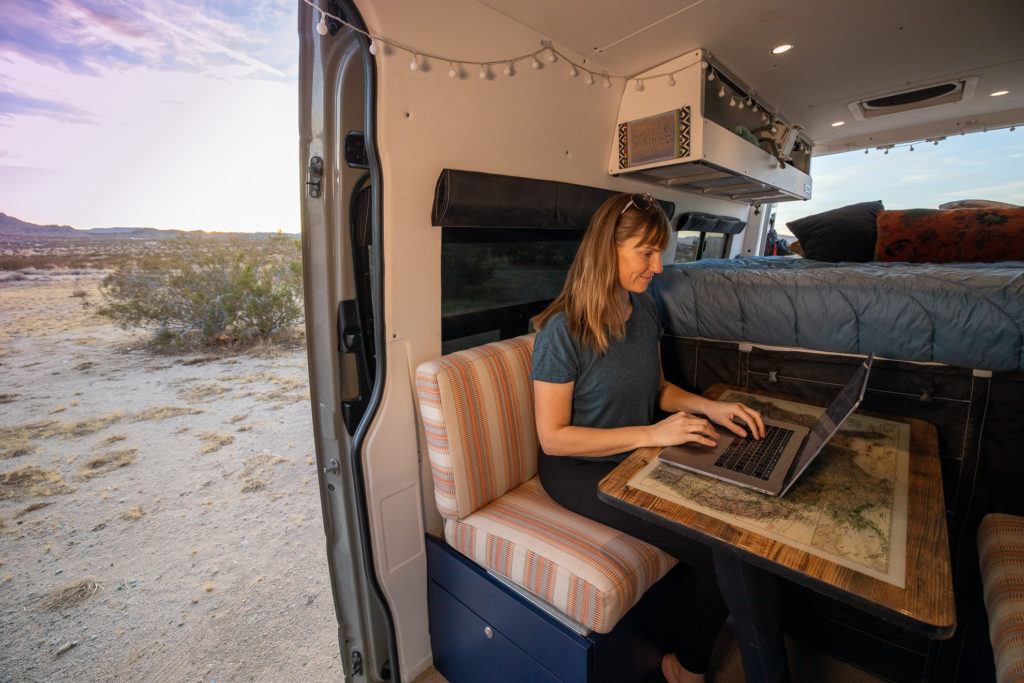
Seasonal Work Ideas
Don’t mind being semi-stationary? Get seasonal work somewhere, for example, the National Parks are a great option, and ski resorts are always hiring multiple positions during the winter for all you ski bums out there. Cool Works and Basecamp Outdoors are great resources for finding seasonal gigs.
If you’re planning on moving around more often and need something temporary, get in the habit of checking Craigslist to see if there are events in need of staff or other places just looking for some extra help. If you like pets, trustworthy dog walkers are always in high demand!
How Much Does Van Life Cost?
Van life can fit into any budget. Whether you’re looking to live cheaply on the road or not, the cost of van life varies from person to person. Expenses depend on a lot of factors such as where you camp, how much you drive, whether you eat out often, and what activities you do along the way. I know van lifers who live on $800 a month and others who spend $2,000 or more.
The biggest expense of van life will most likely be buying your van and converting it. New empty vans cost around $40,000-$70,000 while conversions can vary from $10,000-$20,000 if you do it yourself or upwards of $250,000 for a professional, fully decked out van built by a top conversion company. Keep in mind that these are just estimates. Costs are different for everyone depending on their budget.
The cost of daily life on the road depends on whether you treat van life like your real life or a vacation. Do you eat or cook in? Do you pay for campsites or stay on BLM land? Do you focus on free activities or splurge on big adventures? In this blog post, I share some my budget and the common expenses you should plan for as a van lifer: How Much Does Van Life Cost? A Breakdown of Common Expenses.
I also share tips on saving money and living on a budget in your van.
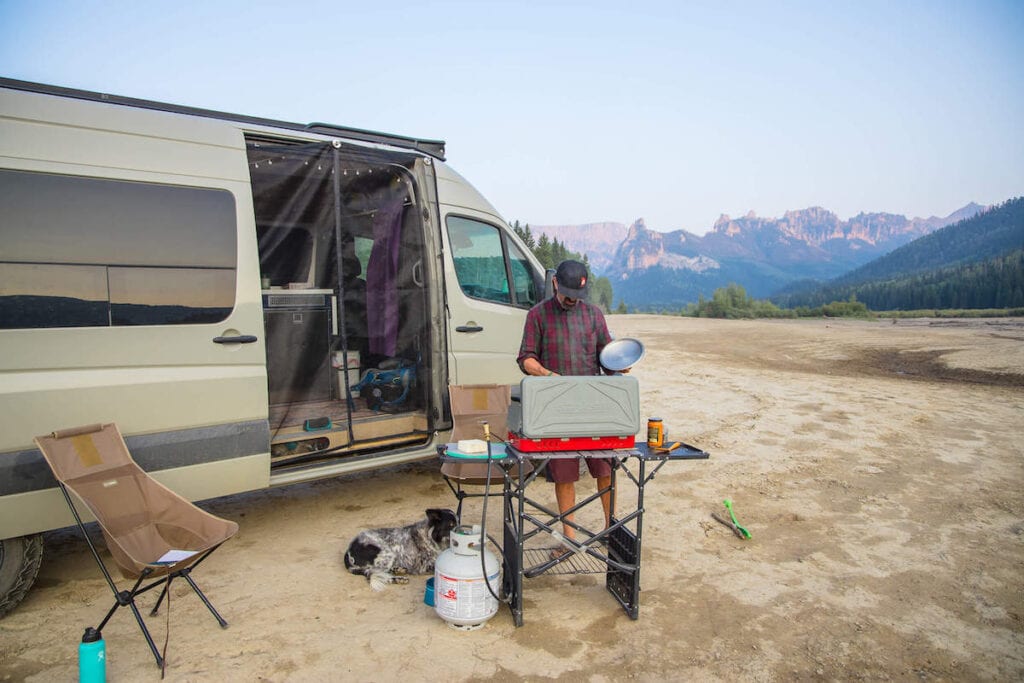
Now, It’s Time for Your Adventure!
Once you’ve got all your systems dialed, it’s time to put them to good use and go have some fun! Learn how to plan a stellar van life road trip with my detailed road trip guides and itineraries.
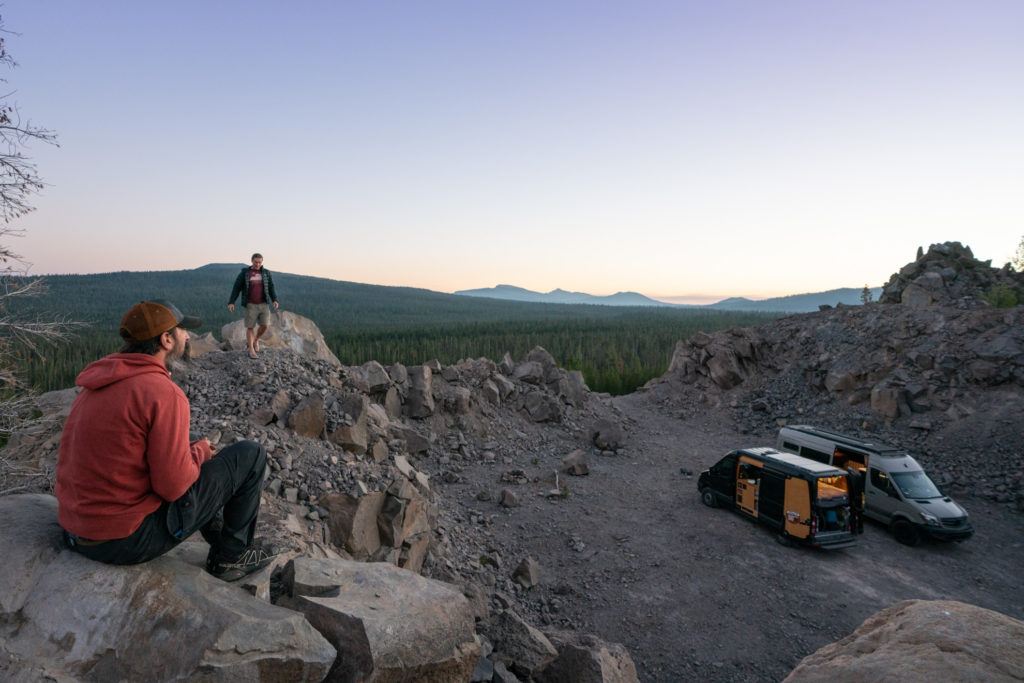
I hope this post has answered your frequently asked van life questions and given you the inspiration and confidence to start your own van life adventures! What did I miss? Leave us a comment below.

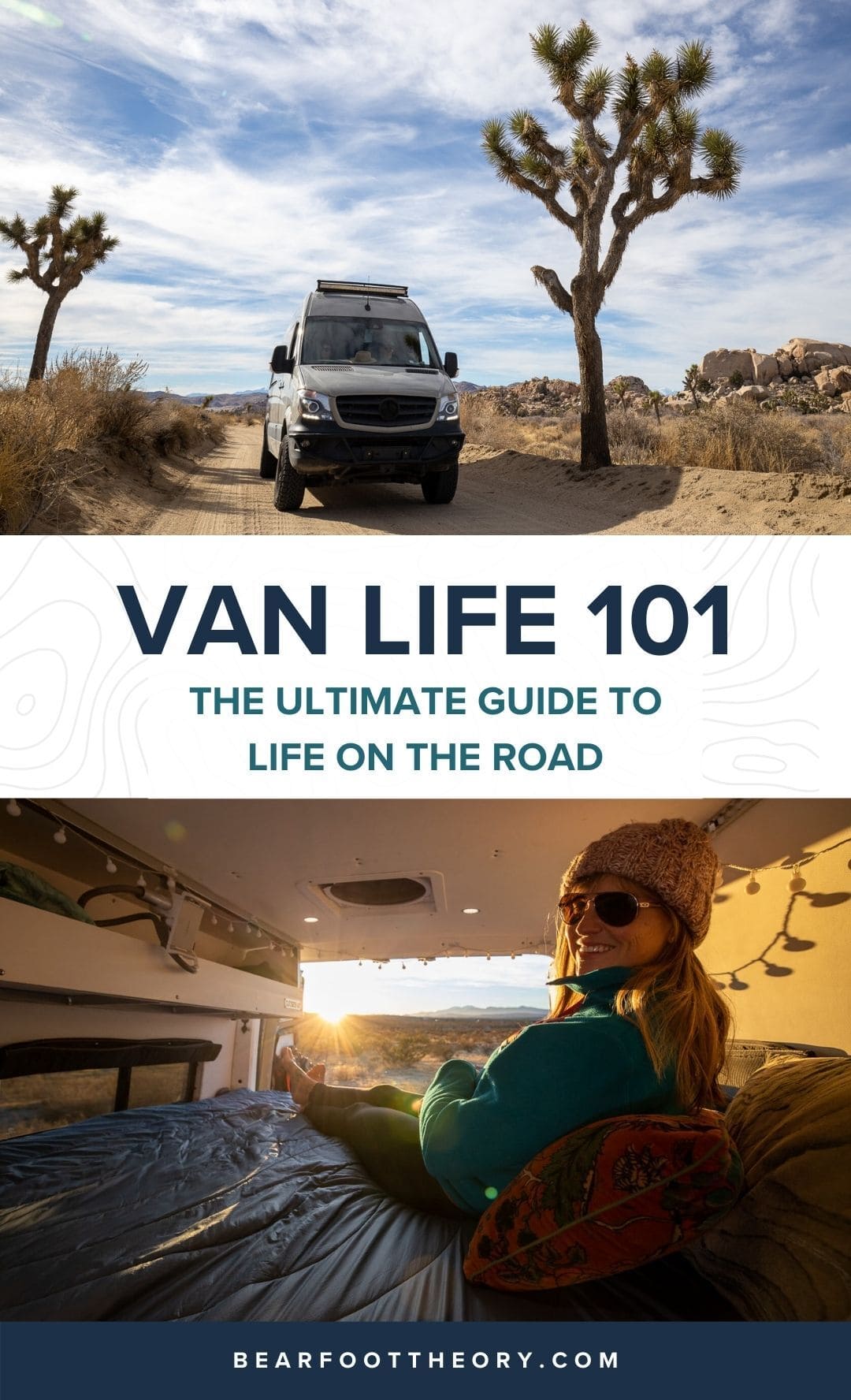
This was a great article. It was full of useful information.
Thanks for reading!
This is the best article I’ve found so far, really gave me a lot to think about and consider as I’m diving into this new lifestyle! Thank you!
Glad you found it helpful!
I have read a few van life articles, yet none of them mention one important issue. Your address. Cop stops you for whatever reason, what address you have in your driver’s license? I assume you have a bank, no? Banks, credit card companies, and even your year end tax return requires an address. Not a PO box. Banks do not accept addresses to mail facilities or fedex-type, mail forwarding locations. If you rent storage space, bingo! You need to put down your address. Debit card, credit card expiring soon? Where will the bank send it to? For some reason, nobody mentions this crucial information. Parents? Friends? Relatives? Dude, not everyone is 25. Eventually people get old and die. With no friends, relatives, or family, whose address are you going to plunk down? Articles like these always “forget” to talk about the realities of life. Since I am in a position where it would be cheaper for me living in a van, you have no idea how difficult this single issue to get around. I am not a junkie and never did drugs. Never drunk, never smoked or even drank coffee. But when you end up all by yourself, things can get really complicated just by this little meaningless thing you call “address”.
Hi Ben, that sounds like a tough position to be in. However we know tons of people living on the road full-time who make it work without an “address”. It can definitely be tricky at first, but we outline several options in this blog post about establishing residency & getting mail: https://bearfoottheory.com/van-life-establishing-residency-getting-mail/
Getting a mail forwarding service that caters only to nomads might be the best option for you.
hi my name is joseph I am now retired I drove an 18 wheeler for over 30 years I now draw a disability check which gets direct deposit into my checking account since I am used to living in a small confined space I think van life would be great for me I have already spent 1 year living in a van but was around family where I could use the restroom take showers and wash and dry clothes but have spent several weeks on free camp grounds as well I love traveling and I love the open road and the freedom that comes with it im hoping to get another van and do van life full time
Hi Joseph, it sounds like you’ve had a great introduction into van life! We agree that there’s nothing quite like the freedom that comes with living in the van and getting to travel. Best of luck with getting a new van and taking the leap to full time!
I love this article except one thing: It’s not even an option for me to WFH with the full-time job I currently have (and am planning to keep). I’ve thought about buying a small RV but would have to find somewhere to park it each and every day, both while at work and when I leave work. Any ideas?
Hi Ben, this article about how to stealth camp in cities will give you some ideas of where to park: https://bearfoottheory.com/van-life-stealth-camping/
I will say that a small RV is much harder to be stealthy in, unfortunately.
Thanks for reading & best of luck!
I’m retired/disabled and alone. Any ideas on Dr. appts. and meds.?
Hi Rick, we recommend looking at nationwide healthcare plans that way you can see doctors who are not in your home state. To make refilling prescriptions easier on the road, choose larger pharmacy networks like major grocery stores, Walmart, or Walgreens so you don’t have to transfer your prescriptions each time you move from place to place since they will already be in their computer systems.
We have a blog post that goes more in-depth on health insurance options on the road: https://bearfoottheory.com/van-life-health-insurance/
Thanks for reading!
well what really killed my Van lifestyle dream is the actually cost of the Van itself..
Hi Dan, the cost of vans has definitely risen over the years but it can still be done on a budget. Our content manager lives out of an older Econoline and has a very basic setup – it might not be as luxurious as other vans but it still gets the job done. Van living doesn’t have to look a certain way!
If you need any tips for how to lower the cost of a van/build, check out this blog post: https://bearfoottheory.com/tips-for-a-budget-diy-van-build/
Some downsides every should consider are you no longer have the community that comes with your former life ( we are hyper-social animals). Your hobbies are potentially quite different and this lifestyle can put tremendous strains on an otherwise strong relationship. When you return, know that life has moved on, friends, family, and places all have adapted to your absence. If its important to you, you will leave only faint marks on the world and not as many deeper ones such as group builds, art projects, and community service. The rootlessness giveth and taketh away.
Great points, thanks for sharing
you had it built? You didn’t build it yourself???
Not the article I was expecting “Van Life 101”.
I’ve designed three vans, but I did not build them myself. With that said, Outside Van (who built my last two vans) is the best in the business, so I learned a ton from them in the process about van conversions. I explain in the article that there are pros and cons to DIY build and everyone needs to figure out the best solution for them. I do have a lot of resources on my website for van conversions, but this article was more focused on the “life” part of van life.